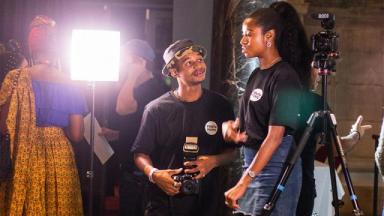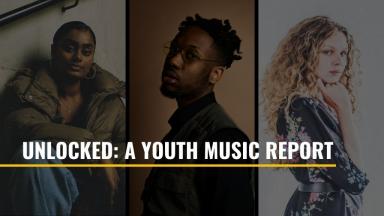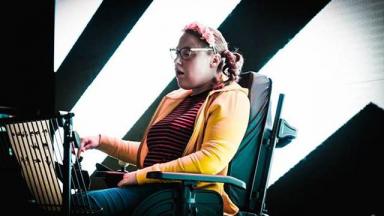
In 2019, we launched Youth Music NextGen, our community for young creatives who aspire to build and work in the music industries of the future. To date, more than sixty 18-25 year olds have benefited from paid freelance work as a result, with more than one thousand also enjoying access to industry expertise and job opportunities through our Youth Music NextGen community.
We wanted to find out what impact we’ve had so far, and what more we can do. By sharing what we’ve learnt, we hope more organisations can help every young person facing barriers in life to earn in music.

Paying and paying fairly for work
Youth Music pays opportunities at the Living Wage, but for many young people responding to the survey, this wasn’t the case. A shocking 41% of young people accessing career progression opportunities in their related fields indicated they had not been paid for their work at other organisations. 29% percent told us that some of the opportunities were paid but less than a third (31%) told us that all opportunities they’ve accessed were paid.
The impact that fair pay for work has on the personal development of young professionals must not be underestimated: “A financial incentive not only boosts productivity but makes you feel professional” (survey respondent).
“Obviously Youth Music pays the Living Wage for every opportunity, every little bit just makes your work feel valued and you’re able to call yourself, ‘oh, I’m a freelancer, because I’m getting paid for the work that I do’. So yeah, it gives value to your work, really.” – Kate
“I knew that I’d have to fork out a bunch of money for work experience … I basically had to pay to work there [a national radio station]!” – Lydia
In some circumstances, like the last quote above, we were told that the cost the young creatives had to fork out to access the work was more than the pay. Not paying or paying poorly for work further excludes young creatives from accessing opportunities.
Perceptions of inclusivity
"Being open to diversity rather than just trying to fill a quota." – India
Young people are adept at spotting the difference between tokenism and genuine commitment to inclusion in an organisation. Employers owe it to our communities to offer opportunities to individuals equitably and inclusively. This includes providing opportunities that aren’t London-centric, accessible application formats and ensuring that every voice in the team gets heard, to name a few.
87% of overall survey respondents felt that to a good/great extent, Youth Music NextGen is inclusive in their approach to creating opportunities for young people, and our interviewees agreed:
“I think all of us felt that we were really part of the team, it wasn’t ‘us and the Youth Music team’, it was everyone was part of one group. We were constantly asked for our input, we weren’t just sort of in the background or silenced which was really, really nice” – Charlotte
Networking with peers
"Everyone had different levels of experience and everyone had gone through completely different routes, education wise and career wise, so it was great because I was meeting people at different levels of education and their life." – Gemma
Many Youth Music NextGen members spoke to us about the benefits of networking with other creatives. Youth Music’s recent report, A Blueprint for the Future, further explores the potential and impact of horizontal networking: “And all the evidence suggests these informal collectives and forms of ‘horizontal networking’ only grow in importance as young women and people from under-represented backgrounds mature in their careers, providing mutual support and career scaffolding outside of formal industry structures.”
This is especially necessary in industries where there is a disparity felt between those at the top of their craft, those who have made significant progress more recently, and those who are starting out.
These networks provide the opportunity to tap into different perspectives and groups with diversity in their experience. Reflecting on how Youth Music could provide a different perspective to the young people within her own network, India told us:
“Just to hear about different people’s paths, it seems like everyone’s been to university! And yeah, I know that there must be some people that haven’t and I want to hear about how they did it.” – India
Methodology
In autumn 2020, we asked NextGen how much impact we were having and what more we could do to facilitate the development of young creatives’ careers. Respondents could then opt-in for a follow-up interview.
You may also like...
Opportunities Board
Discover early stage jobs in the music industry, as well as opportunities to perform, develop skills and gain experience.
UNLOCKED: Seven aspiring young musicians experiences during COVID-19 (long read)
In June 2020, we hosted two online focus group discussions with young musicians (aged 18-25) at various stages of their musical careers. This report explores some of the ways in which the coronavirus pandemic has impacted on the lives and careers of these seven young musicians.
Reshape Music report
Our report sets out the significant barriers faced by Disabled musicians to access music education and music-making.




